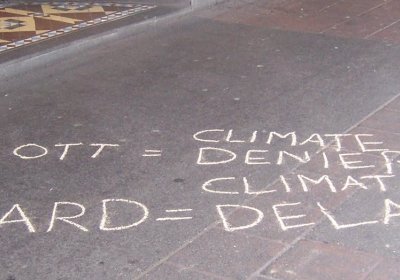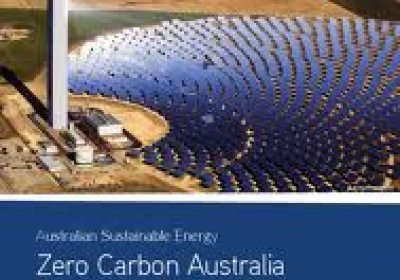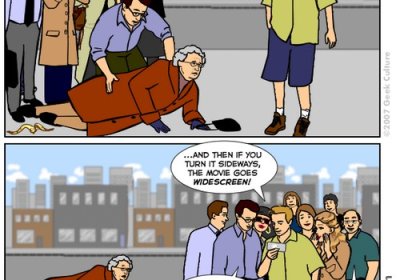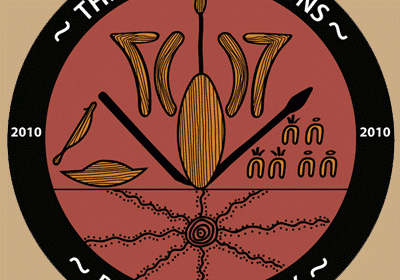Dismayed by the Labor government’s inaction on climate change and looking for an alternative? Don’t look to the Liberals.
If the ALP has been dodgy on the issue, Tony Abbott’s party has been dodgier.
Sincere commitment on the issue is hard for Abbott. At a public meeting last September, he said global warming was “absolute crap”.
But the Liberal leader is remarkably consistent on one thing — the “need” to funnel large amounts of public money to big business.
Environment
VoteClimate.org.au has released a detailed description of the climate policies of parties contesting the August 21 federal election. It is the world’s first dedicated climate election website and is run by climate activist Adrian Whitehead, a founder of Beyond Zero Emissions and a Target300.org campaigner.
The site, which includes links to each partiy’s policies, ranked the policies as following:
In Russia, a seven-week-long heatwave has caused giant firestorms to break out across more than 114,000 hectares of the country. At least 48 people have died and more than 400 new fires broke out on August 4 alone, the Kyiv Post said that day.
Russian President Dmitri Medvedev said on July 30 that “practically everything is burning” in 14 regions of the country, Time said on August 2.
In the past, Medvedev has not seemed too concerned about climate change. At last year’s Copenhagen climate conference he bluntly announced that Russia would increase its emissions.
The Socialist Alliance proposals for the federal election, detailed at www.socialist-alliance.org, won’t come cheap. They include lifting welfare payments above the poverty line, ending the 200,000 public housing waiting list, achieving 100% renewable energy by 2020 through a plan of public investment, boosted public transport including inter-city high-speed rail, and closing the gap in Indigenous health, education and housing.
Conservation groups from Tasmania, Victoria, Western Australia, New South Wales, Canberra and Queensland took part in local actions on August 5 to highlight the threats to biodiversity that burning native forests for electricity will create.
The Parramatta Climate Action Network (ParraCAN) staged a series of rolling protests outside New South Wales state government ministers offices calling for no new coal
The NSW state government is planning to construct two new coal-fired power stations, which will increase the state’s greenhouse gas emissions by up to 15%.
ParraCAN is circulating a petition calling for the prohibition of the construction of new coal-fired power stations; the development of a phase-out plan for coal; and that the state government support job creation in renewable industries.
On August 3, the Ecuadorian government signed a landmark deal to prevent drilling for oil in the ecologically unique Ishpingo-Tambococha-Tiputini areas of the Yasuni National Park (Yasuni-ITT).
The agreement, signed by the government of left-wing President Rafael Correa and the United Nations Development Program (UNDP), guarantees that the estimated 900 million barrels of oil that lie beneath the pristine Amazonian region will remain untouched, as will the forest above.
In the midst of a Federal Election and with the major party leaders equivocating on climate change and a price on carbon, the Zero Carbon Australia Stationary Energy Plan will be launched at a free public forum in Sydney Town Hall on Thursday 12 August at 6.00 pm.
Hosted by the journalist and broadcaster, Quentin Dempster, the speakers will include:
· Malcolm Turnbull, MP for Wentworth
· Bob Carr, former NSW State Premier
· Scott Ludlam, Greens Senator for WA
· Matthew Wright, Executive Director, Beyond Zero Emissions
· Allan Jones, Sustainability Expert, City of Sydney
Protesters had coal trains backed up for kilometres at the small mining town of Collinsville, inland from Bowen, north Queensland, on July 26. They were protesting against the dust and noise of the trains, and the plan to upgrade the rail line to bring up to 70 coal trains a day through their town.
About 15 coal trains a day rumble through the middle of Collinsville. The residents picketed the line for three days, bringing coal train traffic to a complete halt.
“Yes, the notable features with iPhone 4 — both the device and the iOS4 — are mostly tweaks”, said a June 22 review on the popular site BoingBoing.net. “But what tweaks they are.”
In the interests of full disclosure, I’ll admit I have no idea what “iOS4” means. But my eye was caught by the admission that the iPhone 4, launched in Australia on July 29, was almost the same as the iPhone 3.
Corporations use “inbuilt obsolescence” as part of artificially creating markets. This means the products they sell are deliberately made to break down — so we have to keep buying more.
The First Nations Political Party (FNPP) is a new party contesting the upcoming federal election. The party will contest two lower house seat a and field a four-person senate ticket in WA. It will also run a senate candidate and content a lower house seat in the Northern Territory.
Aboriginal activists Marianne Mackay and Glenn Moore began working towards forming an Indigenous political party in late 2009. They have a goal to getting Aboriginal people elected to parliament.
“We need a pure Aboriginal voice in parliament”, Moore told Green Left Weekly.
Food security will be a focus of November’s Climate Change/Social Change conference, being held in Melbourne. An entire workshop stream will be devoted to the topic.
The global food system captures the insanity of production for profit: One in six people in the world are malnourished, yet the United Nations estimates that 40-50% of all food in the United States is wasted.
Food waste makes up to half of Australian landfills.
- Previous page
- Page 282
- Next page










